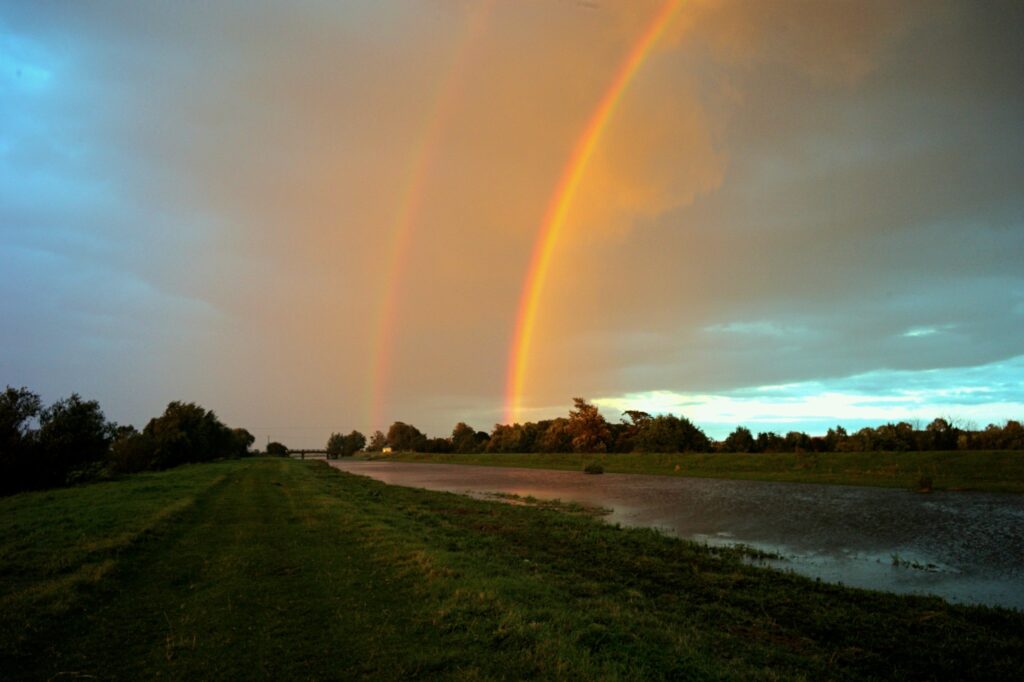Where the rainbows end
Sutton Gault, Cambridgeshire.
Quote of the Day
”The great nations have always acted like gangsters, and the small nations like prostitutes”.
- Stanley Kubrick
Musical alternative to the morning’s radio news
Haydn: String Quartet In F Minor, Hob. III:35, Op.20 No.5 – 3. Adagio | Emerson String Quartet
US politics and psychic colonisation
I’m puzzled (and annoyed) by the extent to which the US election is preying on my mind. Every day I could write a dozen blog posts about some or other aspect of it. It’s sucking the oxygen out of everything. And it’s not as though things are particularly rosy in this jurisdiction, as the country lurches through a worsening pandemic into the full-blown catastrophe of crashing out of the EU without a deal on New Year’s Eve. There’s plenty to worry — and write — about on this side of the pond. Maybe it’s because there’s a possibility that on November 3 something might change in the US, whereas we in the UK are stuck with the worst government in living memory for another four years. So we’re like long-term prisoners serving time and looking enviously over the wall at our fellow-prisoners in the US who might just be paroled on November 4.
Long read of the Day
And just as I hit the final full stop on the previous entry when what should pop up in my inbox but “The World Is Trapped in America’s Culture War” by Helen Lewis in The Atlantic .
Sharing the internet with America is like sharing your living room with a rhinoceros. It’s huge, it’s right there, and whatever it’s doing now, you sure as hell know about it.
Every country using the English-language internet experiences a version of this angst—call it the American Rhino Problem. With so many dominant tech companies headquartered in Silicon Valley, the rules of the web are set there—and by politicians in Washington. The West once sent missionaries to bring Christianity to Africa; in 2013, Mark Zuckerberg promised to “bring the world closer together” by providing internet access to millions in the developing world. (That particular project failed, but there are now more Facebook users in India than anywhere else.)
Britain, where I live, cohabits particularly closely with the American rhino, because of our shared language and history. Brits watch Friends. We read John Grisham novels. We know what a sidewalk is, even though it should be called a “pavement.” The website of the BBC, our national broadcaster, is always plastered with stories about the U.S., while Ireland, which was under British rule until a century ago and with whom we share a border, might as well be the moon. Ask 100 Britons to name the current Taoiseach, and you’ll see 99 blank faces (and one inevitable smart-ass). Ask 100 Britons to name the U.S. president, and—well, I envy anyone who draws a blank there. Please give me directions to the rock under which they’ve been living.
The British political elite loves the United States: Every political adviser here goes to sleep hugging a West Wing box set. Great stuff.
The phlegmatic British
An intriguing Covid diary entry by David Vincent.
Since late March, social scientists have been striving to measure the impact of the crisis on what in the second world war was called ‘morale’. I have discussed some of their findings in earlier posts.
The two most useful studies are managed by the Office for National Statistics (ONS), and a Nuffield-funded research group at University College London (UCL). For the sake of speed, the ONS re-deployed an established Opinions and Lifestyle Study, based on a statistically representative sample of 2,200 people. UCL went for scale, recruiting over 70,000 respondents through advertising and contacting ‘organisations representing vulnerable groups.’
The data in the two surveys are broadly similar, and oddly counter-intuitive. Whereas the drivers of physical change represent a fairground roller coaster during an event which is far from reaching its conclusion, the dominant shape of the graphs of emotion over the period is a gentle countryside, a landscape of gradual inclines and declivities. Why this should be so is difficult to understand.
It is.
There are, David says, “discernible changes tracking the surges in the pandemic, but not on the same scale. We appear to be a more phlegmatic society than we might suppose, as was also the conclusion of the wartime studies of ‘morale’. ”
Another, possibly interesting, link
- Apple Watch’s Sensory Overload. Om Malik on Apple’s latest version of its watch. Interesting because OM suffers from heart problems, so having a monitoring device as good as the iWatch on his wrist matters. Link.
This blog is also available as a daily email. If you think this might suit you better, why not subscribe(https://johnnaughton.substack.com)? One email a day, delivered to your inbox at 7am UK time. It’s free, and there’s a one-click unsubscribe if your decide that your inbox is full enough already!

